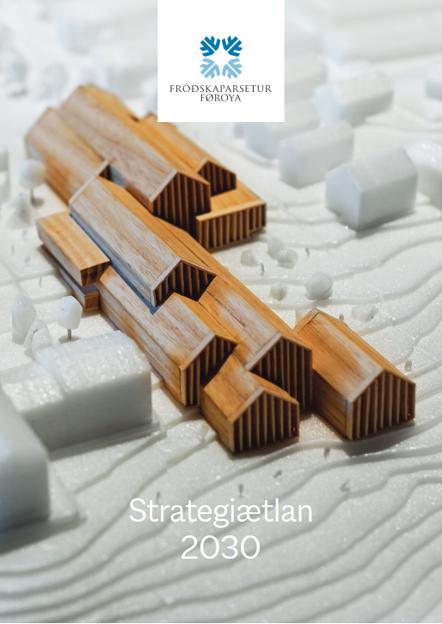
Martin Tvede Zachariasen, the rector, together with staff, the board, and external stakeholders, has updated the strategic plan for the University of the Faroe Islands. (Foto: Jens Kr. Vang)
New Strategy: The University Must Be More Flexible
New updated educational programs and more flexible offers. The University of the Faroe Islands has updated its strategy, with goals including offering more part-time studies to reduce pressure on the labor market and opening up more with various short courses under the banner "Open University."
The University of the Faroe Islands has presented a new strategic plan up to 2030. The plan is broad, but in this instance, focus is placed on current media discussions regarding the high demand for labor in the Faroe Islands.

The residency in the Faroe Islands needs strengthening, as it is neither economically nor socially sustainable that 40 percent of young people leave the country, with only half returning.
We can and should make the Faroe Islands a better place for our young people to study by providing better educational opportunities. However, we cannot avoid investing in student housing and campus facilities if we want to reduce the outflow of students from the country.
The University seeks to build bridges to secondary education and higher education at Glasir, so that more young Faroese, who would otherwise have left the country, choose to study in the Faroe Islands. But we also want to update and develop the programs so that they align even more with the needs of both the public and private labor markets.
We must not underestimate how necessary young people are as part of the workforce – even while they are studying. Research shows that our approximately 1,000 students at the University of the Faroe Islands work an average of 18 hours per week, so it is evident that the full or partial workforce of the 40 percent who go abroad to study would make a significant difference at home.
We have also taken note of the growing need for workers in the welfare sector.
The three major vocational bachelor’s programs offered by the University for the welfare sector are in pedagogy, nursing, and teaching. The welfare sector – particularly the health sector – is becoming increasingly complex, and the demands for qualifications on those pursuing vocational education continue to rise. It was encouraging that the number of applicants for the teacher education increased so much this summer, and that we are not seeing the same decline in nursing applications as in neighbouring countries. However, we take the decline in pedagogy applications seriously and are working on creating an adapted part-time program, which may be shorter than the full bachelor’s degree.
Overall, we at the University need to offer more part-time education so that students can more easily stay connected to the labor market. This aligns with the overarching goals of lifelong learning and flexible learningl paths, which are better suited to a wider range of target groups and age groups. We must also keep in mind that 55 percent of students at the University are over 25 years old, and over time, new and more costly obligations tend to arise.
However, we must always keep the quality of education at the center. We at the University can create more flexible learning paths and add shorter courses, but we must never compromise on the quality of the education. The Faroe Islands are aligned with the European Higher Education Area (EHEA), and thus, we are committed to international quality standards in education and research.
It is very unfortunate that we still lead people into educational dead-ends in the Faroe Islands, where they cannot pursue further studies. This should not happen, and with the law on the Faroese Qualifications Framework, which was passed earlier this year, we hope this situation will become a thing of the past. The purpose of establishing a Faroese Qualifications Framework is, among other things, to better integrate our education system so that people who have acquired qualifications within our education system will never find themselves without opportunities for further study.
Read the new strategy plan from the University here.



